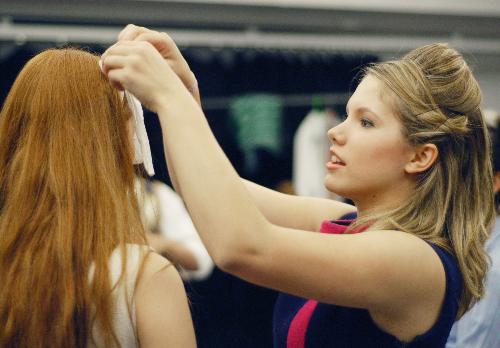
News
Summers Will Not Finish Semester of Teaching as Harvard Investigates Epstein Ties

News
Harvard College Students Report Favoring Divestment from Israel in HUA Survey

News
‘He Should Resign’: Harvard Undergrads Take Hard Line Against Summers Over Epstein Scandal

News
Harvard To Launch New Investigation Into Epstein’s Ties to Summers, Other University Affiliates

News
Harvard Students To Vote on Divestment From Israel in Inaugural HUA Election Survey
Lillian Ritchie
SPOTLIGHT

For Lillian Ritchie ’08, the director of the current Loeb Experimental Theatre production “Lady Windermere’s Fan” that runs through this Saturday, a chance to get out of playing sports resulted in the discovery of acting, a pursuit she has been deeply involved with ever since.
I was in seventh grade at an all-girls school, and our brother school was putting on a play and needed five girls to be in it, so instead of sports, which was really the only thing to do at my school, I got to be in a play.
From that first role as Hippolyta in “A Midsummer Night’s Dream,” Ritchie continued to perform in plays throughout high school and has acted in a play every semester that she has been at Harvard. This semester, however, Ritchie is tackling a new aspect of the stage—that of directing.
I’d done tech directing and costume design and various other jobs with shows, and the more familiar I got, the more I thought I’d really like to try putting together my own show.
Ritchie’s directorial debut is Oscar Wilde’s play “Lady Windermere’s Fan,” which she discovered last year in an English class.
I felt like I really understood the play, and it stimulated my imagination so much I knew I could do a good job with it. As I was reading the play I thought of a lot of people I knew who would be good in roles.
The play centers on Lady Windermere, a Victorian woman who leads a perfect life until receiving some unexpected news from a neighbor. Though Ritchie’s play is not an adaptation, she does put a spin on the time period, changing the setting from the 1800s to the late 1950s.
A lot of the ideals in the play focus on being the perfect housewife and having the perfect reputation, which are very applicable to the late 1950s and early 1960s. I think that time period is very recognizable to people, either through pop culture or because they lived through that time themselves. That connection makes the audience much more likely to engage with the play.
Part of the appeal the play holds for Ritchie is its status as a lesser known play by a well known playwright.
I hate going to a show that’s been done many times before and expecting what I saw last time and then being disappointed. The more well known Oscar Wilde plays would have set those kind of expectations, but with this one, the various adaptations that have been done are either out of date, or didn’t do well in theatres.
Wilde’s play so inspired Ritchie, that much of her directing style is based on Wilde’s personal philosophy on life.
One of Wilde’s big points in his personal philosophy was to never take anything seriously, so we just took the text and ran with it and really had a lot of fun.
Ritchie’s desire to have fun with her play led her to use tactics like “speed-throughs,” in which actors run through scenes in fast forward to help with pacing and memorization.
We did occasional speed-throughs and specifically told the actors to mess around and have fun, and we found comedic gold. When you don’t take it seriously you allow yourself to take risks that you wouldn’t take otherwise. A lot of our best parts came from the speed-throughs—in one case, one of the actors decided to do a scene like it was from “Brokeback Mountain” and he ended up sticking with the character that came out of it.
Want to keep up with breaking news? Subscribe to our email newsletter.
